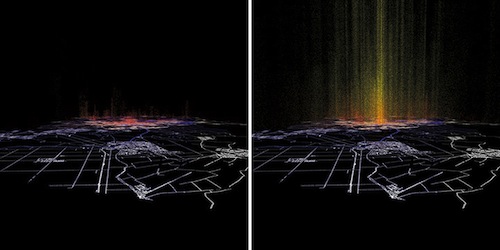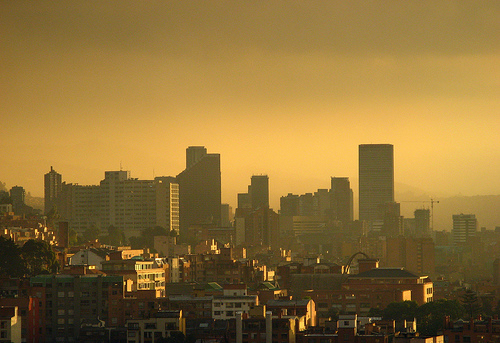I’ve seen and heard a lot about the notion of a “city as a platform.” I haven’t seen a lot of great definitions of exactly what is meant by it though, so I thought I would explore various dimensions of the concept a bit.
Let’s take a look at the actual definition of the word platform, of which there are several:
- a raised horizontal surface or stage
- a document stating the aims and principles of a political party
- the combination of a particular computer and a particular operating system
- a military structure or vehicle bearing weapons
- a section of pathway, alongside rail tracks at a train station, metro station or tram stop, at which passengers may board or alight from trains
- a woman’s shoe with a very high thick sole
It is immediately obvious how we can think of some of these as applicable to cities.
The City as a Stage
In this view, the city serves as a place for personal performance. Like a speaker or actor mounting a platform in order to be heard, people come to a city to get noticed. This is simple, but powerful. Cities are where the action is. Even if you perform your work or live your life elsewhere, if you want people to know about it, you generally have to come to the city or somehow get someone in the city to pay attention.
The bigger and more prominent the city, the bigger the stage. This creates a positive reinforcement cycle.
 Share-It Square in Portland, OR, by Bike Junkie
Share-It Square in Portland, OR, by Bike Junkie
The City as a Manifesto
The political platform version wasn’t something that originally came to my mind when thinking of this, but it too has applicability. What is your city all “about”? What does it stand for? What is its ambition? I’m reminded again of Paul Graham’s piece “Cities and Ambition“:
Great cities attract ambitious people. You can sense it when you walk around one. In a hundred subtle ways, the city sends you a message: you could do more; you should try harder.
The surprising thing is how different these messages can be. New York tells you, above all: you should make more money. There are other messages too, of course. You should be hipper. You should be better looking. But the clearest message is that you should be richer.
What I like about Boston (or rather Cambridge) is that the message there is: you should be smarter. You really should get around to reading all those books you’ve been meaning to…
How much does it matter what message a city sends? Empirically, the answer seems to be: a lot. You might think that if you had enough strength of mind to do great things, you’d be able to transcend your environment. Where you live should make at most a couple percent difference. But if you look at the historical evidence, it seems to matter more than that. Most people who did great things were clumped together in a few places where that sort of thing was done at the time.
Think about the great cities of America, and they all seem to have something of a point of view on the world and what it should be like, even if it isn’t totally clear. Especially for those cities where the civic ambition and POV is murky, a process of reflection on this is clearly warranted. Going back to the notion of a stage, since not everyplace can be New York or London, the question might be how you can create a premier stage or environment in which to attract notice for a focused set of activities or ambitions.
Credit: Claire Kessler-Bradner
The City as a Computing Environment
It strikes me that today when people talk about the city as a platform, they are often making some variant of an analogy to computing. See, for example, “The City as Interaction Platform."
As a tech guy myself, I find this one particularly of interest. A computing platform is collection of capabilities, services, and constraints that is generally shared among multiple users. In this sense, the platform defines what can and can’t be done, how easy or hard it is to do things, and mediates between users and activities.
You can think of a classic hardware/operating system combination like Wintel. But you can also think of applications like Twitter or Facebook. Some platforms, like the ones I mentioned, were and are extremely powerful and durable. Others either flourish then wither, or never get much traction to start with.
What factors affect this and how might they shape our thinking about urban success? Some that I would suggest include:
- Platform power. Ultimately how much can your platform do? Does it have constraints that limit it? (Sometimes, a city might consider constraint a good thing, however). What services is it providing that make your life easier?
- Network Effects. As with William H. Whyte saying people attract other people, users attract more users, more R&D, etc. That’s obviously a huge factor in the success of major social networking sites like Facebook, Twitter, and LinkedIn. People go there because other people are there. This implies that scaling quickly is important.
- Timing. First mover advantage is sometimes key, but often the first people to pioneer a market fail, and it is only the second or third generation that gets it right. (Friendster, anyone?)
- Adaptability. The Unix operating system was easily adaptable to many different hardware platforms and architectures. This has made it one of the most successful operating systems in history, and one that has stood the test of time. Operating systems tied too closely to particular hardware platforms or particularly technology problems typically fail once technology moves on.
- Openness. In a related note, how well does the platform interact with others? Companies like Apple and IBM thrived with “closed platform” systems. But notably Apple stumbled once and easily could again. IBM also went through struggles. I tend to think that standards compliance, interoperability, and multi-vendor approaches are more robust over the long term.
- Ease of Programming and Use. One of the computer systems I worked on in college ran an operating system called VMS, which was extremely baroque. If you wanted to change your directory, you’d have to type some obscure command like “$ set default $disk54[arenn].” Everyone who worked on VMS system had scores of “utilities” that made the system usable. The greatest epiphany of my computing life was when I got an account on a Unix system, went to port over my VMS utilities, and found they were superfluous.
How do these apply to a city? Again, easy to see. Your city has to offer a set of “services” and it has to be easy to access them. Your city needs to be able to adapt over time. Etc.
This is something I think deserves more study. What makes a platform like Twitter so successful? What lessons can we learn? This might also make a useful framework for comparing cities.

The City as Weapons System
What I find interesting about this is the notion of power. Cities are powerful places. This is true for good or ill. Cities can be a “force multiplier” for people who are working in harmony with them, but they can also be a force that squelches people. Depending on what you are trying to do, a powerful city or a weak city might be more appropriate.
The City as a Train Station
Again, I even find merit in this. We can think of the city as the place we access networks that give us the ability to travel to or interact with other places and things. They are our “network access point.” Just as some train stations or air hubs have better service that others, so to with cities. How many networks does it give you access to? How can you improve your connectivity?

The City as Stripper Heels
Cities have always alternately attracted and repelled by the little bit of Sodom they all contain. “They tell me you are wicked and I believe them, for I have seen your painted women under the gas lamps luring the farm boys.” Cities define worldliness. They have always drawn those who long to be free of the strictures of their origins. They’ve long been the target of ire and suspicion from those who fear their unholy influence.
—
Aaron M. Renn is an urban affairs analyst based in Chicago and author of The Urbanophile, where this article originally appeared.









